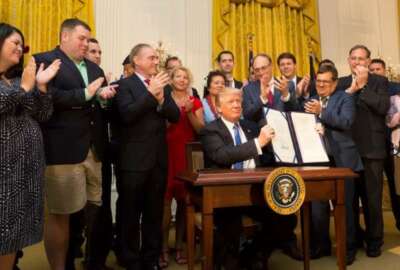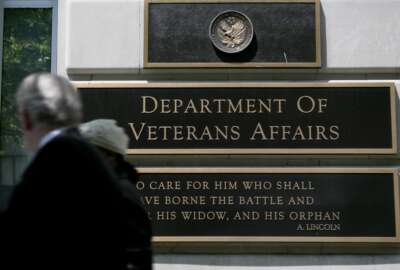Lawmakers declare lack of confidence in VA’s accountability office
Lawmakers said they still couldn't recommend the Department of Veterans Affairs' accountability office as a safe space for whistleblowers, despite VA's assertio...
Best listening experience is on Chrome, Firefox or Safari. Subscribe to Federal Drive’s daily audio interviews on Apple Podcasts or PodcastOne.
A bipartisan group of lawmakers say they’re anxiously waiting for current leadership at the Department of Veterans Affairs to rehabilitate its accountability office, which has grabbed the spotlight amid recent revelations from the agency’s inspector general.
Some say the failures of past leadership is behind them, and new executives have what it takes to turn the VA accountability office around.
Others, however, appear highly skeptical.
Congress created the VA Office of Accountability and Whistleblower Protection (OAWP) to investigate employee misconduct and safeguard those who reveal waste, fraud and abuse from retaliation.
But, according to the highly-anticipated findings from the VA’s inspector general, OAWP failed to protect whistleblowers from retaliation and often misinterpreted its statutory mission.
Lawmakers say they’ve been fielding complaints about the VA accountability office practically since its initial formation back in 2017.
But the IG’s findings reveal the situation at OAWP was worse than what lawmakers initially believed, Rep. Jack Bergman (R-Mich.), ranking member of the Veterans Affairs Subcommittee on Oversight and Investigations, said Tuesday afternoon during a hearing on the report.
The agency’s investigations were biased, and OAWP developed a “cynical” and “self-serving attitude” under the previous leadership, he added.
The VA inspector general made 22 recommendations on how OAWP could reverse course. The department agreed with all of them, and in some cases, has submitted materials to the IG to begin to address some of the recommendations.
For Bergman, the IG report represents a turning point in OAWP’s rehabilitation. The VA accountability office has had new leadership in Tamara Bonzanto, a veteran, nurse and former investigator for the House committee, since January.
“It’s the commander’s responsibility to establish a command climate and also that command culture,” Bergman said. “When you’re a commander coming in to a unit that’s already established, good or bad, you inherit what you inherit. It is what it is, and it’s not necessarily what you want it to be — yet.”
The VA inspector general recognized OAWP has made some changes under Bonzanto’s leadership. But the IG said it wasn’t yet clear these changes had made a real dent in both VA and OAWP’s culture of retaliation.
“Recent communications to the OIG hotline, however, indicate some individuals continue to harbor a fear of OAWP retaliation and disciplinary action for reporting suspected wrongdoing,” Michael Missal, the VA inspector general, told the VA oversight and investigations subcommittee.
Bonzanto, however, insisted the VA accountability office was in the middle of a major, structural overhaul and said the organization wanted to change the way it did business.
New leadership, SOPs for OAWP
First, OAWP is developing standard operating procedures for investigators, which Bonzanto said should be finished by the end of 2019.
These SOPs are critical, Missal said.
“If you don’t have standard operating procedures, you’re going to have inconsistencies,” he said. “If one of the goals is to earn and get the trust of whistleblowers, it’s hard for them to have that trust if they recognize that the office to whom they’re going to make a complaint doesn’t have standard operating procedures to do investigations.”
In addition, Bonzanto insisted the organizational changes she’s currently making would rehabilitate OAWP.
She’s also reorganized investigations units into smaller teams of 10. OAWP investigators, however, are carrying more cases than they were before, an effort that Bonzanto said would help bring down a backlog of pending matters.
In the past, it took OAWP investigators about 215 days to finish an investigation, and a backlog of 572 cases developed. Some of those cases date back to the office’s inception back in 2017.
Bonzanto said she has set a goal of processing most cases within 120 days, and she wants to eliminate the backlog by end of the 2021.
She’s also in the process of hiring new leadership, people with documented experience working with whistleblowers. Those hiring efforts, she said, have been challenging.
Bonzanto said she filled seven leadership positions at OAWP, and she’s still recruiting five others. Six other positions remain vacant.
“I would honestly like to move faster,” she said. “As you know HR in the federal government takes time. It’s taking about an average of 90-to-120 days to on-board someone, and that’s from the job posting through the interview period. That’s my concern.”
More training and clear performance metrics for investigators are also in the works, Bonzanto said. Recent efforts to train OAWP investigators were controversial.
According to the Project on Government Oversight, OAWP spent roughly $300,000 on training for its investigators in September, which attendees described as “totally useless.” POGO also documented a harried process that OAWP took to procure and conduct this training, which led to avoidable and unnecessary costs.
Bonzanto acknowledged her staff had raised concerns about the qualifications of the contractor who provided the training. The training they received didn’t live up to OAWP’s expectations, she said.
Beyond additional leadership, training and the SOPs, Bonzanto is reviewing all investigative reports for recommendation and closure herself. OAWP has made one disciplinary recommendation so far to the secretary’s office during her tenure, which started in January.
Bonzanto said she too is frustrated she hasn’t been able to recommend more disciplinary actions but has been hesitant to make more, given the shoddy investigative work from her staff.
A nascent quality control team is reviewing reports and recommendations from OAWP investigators and should help fix these past mistakes, Bonzanto said.
And she insisted that whistleblowers should trust OAWP to handle their cases with competence and fairness but recognized “they have a lot of work to do.”
“I value whistleblowers,” Bonzanto said. “I took this position because I valued the input whistleblowers bring to improving VA. As a veteran and a nurse I also know the impact whistleblowers have on an organization when they bring information forward that can really change the operation of the organization. I’ve informed my staff that it’s critical that they listen and they understand the view of the whistleblowers. They understand when they don’t pay attention, lives are impacted.”
Democrats lack confidence in VA accountability office
Still, Democrats on the House VA Committee were skeptical before — and after — Bonzanto described the steps she was taking to rehabilitate OAWP.
“I don’t have confidence in this office,” Mark Takano (D-Calif.), chairman of the House Veterans Affairs Committee, said after questioning Bonzanto. “If I am approached by a whistleblower from my district, I cannot in good conscience direct them to work with your office, and as a member of Congress, have had to do that with VA facilities. That’s not going to change until I see some real progress.”
And a group of six Senate Democrats, led by Veterans Affairs Committee Ranking Member Jon Tester (D-Mont.), expressed similar concerns in a new letter to VA Secretary Robert Wilkie.
“Whistleblowers in the VA are still waiting for your office to perform basic mandates,” Rep. Chris Pappas, chairman of the oversight and investigations subcommittee, said. “I recognize that you want to move OAWP in the right direction. I recognize that you inherited a very complicated and difficult situation when you assumed your position in January of this year. But your testimony and response to questions doesn’t provide a full picture of how you’re going to get there. You don’t have all the metrics and timelines for how your mission will be achieved, and we need to continue to work with you to insist on progress.”
Copyright © 2024 Federal News Network. All rights reserved. This website is not intended for users located within the European Economic Area.
Nicole Ogrysko is a reporter for Federal News Network focusing on the federal workforce and federal pay and benefits.
Follow @nogryskoWFED
Related Stories

New accountability office hasn’t made a dent in VA’s ‘culture of retaliation,’ whistleblowers say
 Exclusive
Exclusive 



